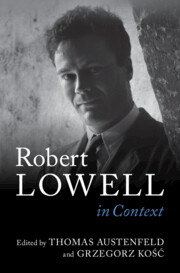Book contents
- Robert Lowell in Context
- Robert Lowell In Context
- Copyright page
- Dedication
- Contents
- Contributors
- Acknowledgments
- Abbreviations
- Introduction
- Part I Places
- Part II American Politics, American Wars
- Part III Some Literary Models
- Part IV Contemporaries
- Part V Life, Illness, and the Arts
- Part VI Reputation and New Contexts
- Chapter 21 Letters
- Chapter 22 Whiteness
- Chapter 23 Appropriation
- Chapter 24 “Raw” Poets
- Chapter 25 Lowell’s Influence
- Chapter 26 Language and Post-Language Poets
- Further Reading
- Index
Chapter 26 - Language and Post-Language Poets
from Part VI - Reputation and New Contexts
Published online by Cambridge University Press: 28 March 2024
- Robert Lowell in Context
- Robert Lowell In Context
- Copyright page
- Dedication
- Contents
- Contributors
- Acknowledgments
- Abbreviations
- Introduction
- Part I Places
- Part II American Politics, American Wars
- Part III Some Literary Models
- Part IV Contemporaries
- Part V Life, Illness, and the Arts
- Part VI Reputation and New Contexts
- Chapter 21 Letters
- Chapter 22 Whiteness
- Chapter 23 Appropriation
- Chapter 24 “Raw” Poets
- Chapter 25 Lowell’s Influence
- Chapter 26 Language and Post-Language Poets
- Further Reading
- Index
Summary
In this chapter, Lowell and Language poets are juxtaposed as opposite interpretations of historical impulses fueling twentieth-century American poetics: modernism and Romanticism. While the poetic culture that elevated Lowell to esteem interpreted those traditions as an injunction to seek the poetic in the authenticity of the personal subjecthood, Language poetry aimed to radically disrupt the entire paradigm. Proposing a unique amalgam of theory and practice, Charles Bernstein, Barrett Watten, or Ron Silliman treated theory as a provocation to revisit the common ground of philosophy and poetry. As such, it was an attempt at rejuvenating the encounter of word and world in order to regain access to the political plasticity of an autobiographical subject’s life. The chapter shows how this paragon of the lyric is fascinatingly revised by such poets as Bernstein, Hejinian, Armantrout, or Peter Gizzi.
Keywords
- Type
- Chapter
- Information
- Robert Lowell In Context , pp. 284 - 295Publisher: Cambridge University PressPrint publication year: 2024

